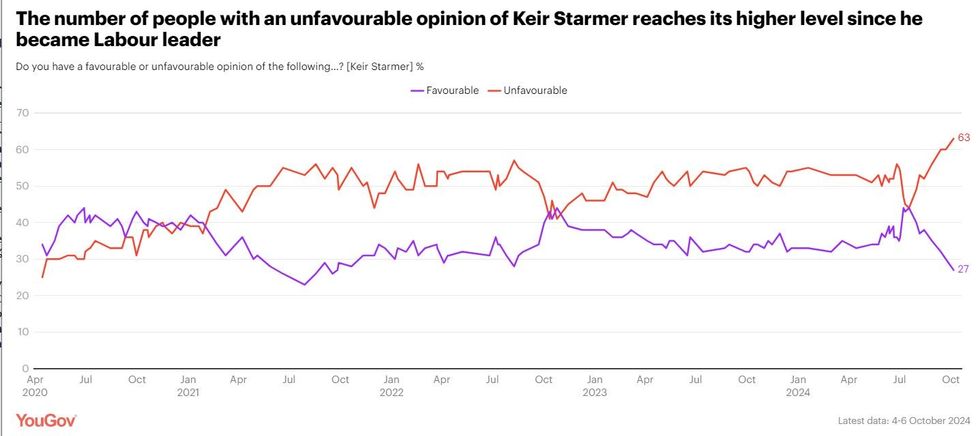Keir Starmer’s favourability rating has plummeted to the lowest level since he took over as Labour leader in 2020.
Just 27 per cent of the British population now have a favourable view of the Prime Minister.
It is a shocking plunge for the Prime Minister who is set to mark his first 100 days in power on Saturday.
The drop means Nigel Farage is now the most popular leader of a political party in Britain.
Nigel Farage surpassed Keir Starmer by one point in the YouGov polling data.
The reputation of the wider Labour party has also been taking a hammering, with 60 per cent now holding an unfavourable opinion of the party versus 31 per cent a favourable one, although at a net score of -29.
Labour do however still have some way to go before matching the unpopularity of the Conservatives on -40.
Even more worrying for Starmer is that a third of Labour voters now have an unfavourable view of Starmer (34%), with 28% likewise having an unfavourable view of the wider party.
Nigel Farage speaking on the latest You Gov polling said: “Nigel Farage is now more popular with the British public that Ed Davey, Keir Starmer, Rishi Sunak and certainly more popular that the current conservative leadership candidates who most of the country have never even heard of.
“Of course I’m delighted but believe me its not just about me. It’s about our five MPs and our growing membership.
“People are getting ready for the fight – because we stand for the right things.”

Latest YouGov data suggests the Prime Minister is not in a happy place
GB News
Asked about the new Government’s specific actions, two policies drew significant disapproval from the public.
By far the least popular policy was the decision, taken in the first few days after the election, to release some prisoners early.
The Government argued this was necessary to alleviate prison overcrowding and prevent the collapse of the justice system, but 68% of those surveyed by YouGov in early October said they disapproved of the measure and just 21% said they were in favour.
Means testing the winter fuel allowance, which has drawn opposition from Labour’s own backbenches, also saw more than half of people say they disapproved, compared to a third saying they supported the move.
But several policies have secured strong approval ratings from the public. Top of the list is agreeing new pay deals with striking junior doctors, approved by 61% of the public and opposed by just 29%.
Lifting the ban on onshore wind farms and keeping the two-child benefit cap – a policy that some Labour MPs were willing to lose the whip to oppose – both had approval ratings of 57%, while 56% approved of suspending some arms sales to Israel.
Scrapping the previous government’s plan to deport asylum seekers to Rwanda had a net approval rating of plus 6%, while the public appeared evenly split on agreeing new pay deals with striking train drivers and the new Government’s handling of the riots over the summer.
The data was compiled by YouGov based on two surveys, each of around 2,100 British adults. The first was conducted between October 4 and 6, and the second between October 8 and 9.Downing Street said the public would decide whether the first 100 days of the Labour Government have been successful.
Asked about whether the first 100 days could be viewed as a success in light of Sir Keir Starmer’s sinking poll rating, a Number 10 spokeswoman said: “That is for the public to judge. The Government is focused on delivery and the action that it takes.”